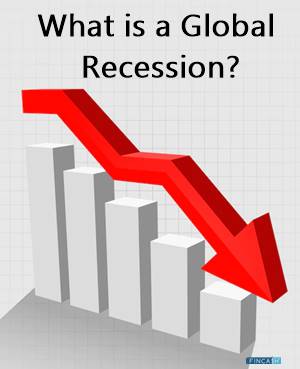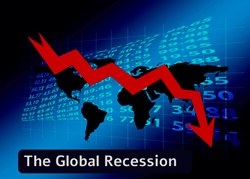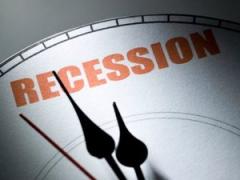
Table of Contents
What is a Global Recession?
A prolonged period of declining worldwide economic activity is referred to as a global Recession. As trade links and international financial institutions spread economic shocks and the effects of recession from one country to another, it entails roughly synchronised recessions across multiple national economies.

A Global Recession, according to the International Monetary Fund (IMF), is defined as "a fall in annual real world Gross Domestic Product (GDP). It is supported by a decline or deterioration for one or more of the seven major global macroeconomic indicators, such as: Industrial production
- Trade
- Capital flows
- Per-capita consumption
- Oil consumption
- Unemployment rate
- Per-capita investment
Examples of Global Recession
According to the World Bank's definition of a recession, there have been four since World War II. 1975, 1982, 1991, and 2009 all saw recessions of a high magnitude. In terms of its effects on the world and the GDP decrease, the 2009 recession was the worst of all.
It is often known as the Great Recession. All of the main economies in the world experienced some level of crisis during the 2009 recession, when the Economy crashed, driven by the collapse of the US Real Estate Market. The subprime mortgage crisis was caused by widespread housing market defaults.
Talk to our investment specialist
Causes of Global Recession
Global recessions can be brought on by a variety of causes, including:
- Wars
- The collapse of asset prices
- Dwindling demand
- The price of energy and other commodities falls
- Lower consumption
- Wage reductions
- A general drop in investor and consumer confidence
Extreme risk aversion that emerges as the recession progresses only serves to worsen the situation.
Effects of Global Recession
The following are some of the main implications of a global recession, which affect both governments and private businesses:
- Consumer spending restraint is exacerbated by the downturn because of high unemployment and low salaries
- Prices of safe-haven assets like gold rise as investors seek them out to protect their cash
- The values of hazardous assets plummet as investors hold off on new investments and sell off their current holdings
- High unemployment and a drop in salaries are effects of the global recession. As businesses attempt to stop their losses from getting worse, workers are laid off
- Numerous defaults that affect financial institutions' net value and occasionally result in Bankruptcy are a common occurrence
- The regulators close the gaps and draft new rules to stop catastrophes from occurring again
Pros and Cons of Global Recession
In general, recessions are bad because they cause extensive damage. However, the following pros should be highlighted:
- When asset values return to normal levels, buyers and investors get investment possibilities
- It aids the decision-makers in comprehending how susceptible their economies are to different circumstances, such as fluctuating commodity prices and loose regulations
- In the wake of a recession, companies and the economy become more efficient
- Excesses are balanced out by global recessions. Economy overshoots from general courses cause it to heat up to unmanageable levels. Recessions in this situation adjust the path as needed
The effects of the global recession are severe in the near term, and it takes a lot of effort to revive economies and enterprises. Here are the cons listed below for better understanding:
- When asset prices fall, investors suffer significant losses
- As governments and monetary authorities hand out more and more money to prevent the economy from imploding, they put a considerable burden on their balance sheets
- Governments adopt a more protectionist stance, which affects free trade and investment and further slows down the Industry
- Falling economic production results in decreased Earnings, rising unemployment, and a drop in consumer spending
- Some nations' economies are at risk of total collapse as a result of the currency rate's severe devaluation
- Social issues arise as inequality and poverty rise in some underdeveloped countries
The Bottom Line
According to the IMF, a global recession occurs every eight to ten years. Each economy experiences a global recession differently. A greater impact is seen by economies that rely substantially on foreign, whereas a smaller impact is felt by self-sufficient economies. Therefore, authorities must move quickly to contain the recession when it occurs, regardless of the type of economic activity, to protect their economies.
All efforts have been made to ensure the information provided here is accurate. However, no guarantees are made regarding correctness of data. Please verify with scheme information document before making any investment.











